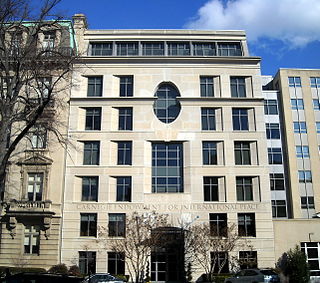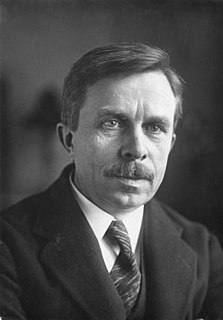Related Research Articles

The United States Atomic Energy Commission, commonly known as the AEC, was an agency of the United States government established after World War II by U.S. Congress to foster and control the peacetime development of atomic science and technology. President Harry S. Truman signed the McMahon/Atomic Energy Act on August 1, 1946, transferring the control of atomic energy from military to civilian hands, effective on January 1, 1947. This shift gave the members of the AEC complete control of the plants, laboratories, equipment, and personnel assembled during the war to produce the atomic bomb.

The Council on Foreign Relations (CFR), founded in 1921, is a United States nonprofit think tank specializing in U.S. foreign policy and international affairs. It is headquartered in New York City, with an additional office in Massachusetts. Its membership, which numbers 5,103, has included senior politicians, numerous secretaries of state, CIA directors, bankers, lawyers, professors, and senior media figures.

The American Legion, commonly known as the Legion, is a nonprofit organization of U.S. war veterans headquartered in Indianapolis, Indiana. It is made up of state, U.S. territory, and overseas departments, and these are in turn made up of local posts. The organization was formed on March 15, 1919, in Paris, France, by a thousand officers and men of the American Expeditionary Forces, and it was chartered on September 16, 1919, by the United States Congress. The Legion played the leading role in the drafting and passing of the Servicemen's Readjustment Act of 1944, commonly known as the "G.I. Bill". In addition to organizing commemorative events, members provide assistance at Department of Veterans Affairs (VA) hospitals and clinics. It is active in issue-oriented U.S. politics. Its primary political activity is lobbying on behalf of interests of veterans and service members, including support for benefits such as pensions and the Veterans Health Administration. It has also historically promoted Americanism, individual obligation to the community, state, and nation; peace and good will.

Warren Robinson Austin was an American politician and diplomat who served as United States Senator from Vermont and U.S. Ambassador to the United Nations.
The Committee on the Present Danger (CPD) is the name used by a succession of American neoconservative and anti-communist foreign policy interest groups. Throughout its four iterations—in the 1950s, the 1970s, the 2000s, and 2019, it has tried to influence all the presidential administrations since Harry S. Truman, achieving notable success during the Reagan administration.

The Carnegie Endowment for International Peace (CEIP) is a nonpartisan international affairs think tank with centers in Washington D.C., Moscow, Beirut, Beijing, Brussels, and New Delhi. Founded in 1910 by Andrew Carnegie, the organization describes itself as being dedicated to advancing cooperation between nations and promoting active international engagement by the United States.
Philip Quincy Wright was an American political scientist based at the University of Chicago known for his pioneering work and expertise in international law and international relations. Daniel Gorman argues that Wright played a major role in transforming international law "from a set of guidelines by which states governed their interactions to a tool for enacting peaceful change in international relations." He is also a pioneer in the field of security studies.

The 93rd United States Congress was a meeting of the legislative branch of the United States federal government, composed of the United States Senate and the United States House of Representatives. It met in Washington, DC from January 3, 1973, to January 3, 1975, during the last 18 months of Richard Nixon's presidency, and the first 6 months of Gerald Ford's. This Congress was the first Congress with more than two Senate Presidents, in this case, three. After the resignation of Spiro Agnew, Gerald Ford was appointed under the authority of the newly ratified 25th Amendment. Ford became president the next year and Nelson Rockefeller was appointed in his place. The apportionment of seats in the House of Representatives was based on the Nineteenth Census of the United States in 1970. Both chambers had a Democratic majority. This is the earliest Congress to feature a member, Representative Don Young (R-AK), who is still serving as of 2021.

The International Law Commission (ILC) is a body of experts responsible for helping develop and codify international law. It is composed of 34 individuals recognized for their expertise and qualifications in international law, who are elected by the United Nations General Assembly (UNGA) every five years.
The Advisory Committee on Postwar Foreign Policy was a secretive committee created on February 12, 1942, to prepare recommendations for President Franklin D. Roosevelt on post World War II foreign policy. Predecessors included the similar Advisory Committee on Problems of Foreign Relations and the Division of Special Research. It was created by Secretary of State Cordell Hull at the suggestion of his assistant Leo Pasvolsky and Norman Davis of the Council on Foreign Relations. The committee appointed subcommittees on political problems, economic reconstruction, territorial matters, legal questions and the creation of an international organization, all under the direction of Pasvolsky. After four sessions, the main committee disbanded, Hull preferring to rely on the smaller subcommittees.

The 42nd United States Congress was a meeting of the legislative branch of the United States federal government, consisting of the United States Senate and the United States House of Representatives. It met in Washington, D.C. from March 4, 1871, to March 4, 1873, during the third and fourth years of Ulysses S. Grant's presidency. The apportionment of seats in the House of Representatives was based on the Eighth Census of the United States in 1860. Both chambers had a Republican majority.

James Thomson Shotwell was a Canadian-born American history professor. He played an instrumental role in the creation of the International Labour Organization (ILO) in 1919, as well as for his influence in promoting inclusion of a declaration of human rights in the UN Charter.
Grenville Clark was a 20th-century American Wall Street lawyer, co-founder of Root Clark & Bird, member of the Harvard Corporation, co-author of the book World Peace Through World Law, and nominee for Nobel Peace Prize.

Edvard Isak Hambro was a Norwegian legal scholar, diplomat and politician for the Conservative Party. He was the 25th President of the United Nations General Assembly (1970–1971).

The League of Nations was established with three main constitutional organs: the Assembly; the Council; the Permanent Secretariat. The two essential wings of the League were the Permanent Court of International Justice and the International Labour Organization.
Eisenhower Fellowships is a private, non-profit organization created in 1953 by a group of prominent American citizens to honor President Dwight D. Eisenhower for his contribution to humanity as a soldier, statesman, and world leader. The organization identifies, empowers and connects innovative leaders through a transformative fellowship experience and lifelong engagement in a global network of dynamic change agents committed to creating a world more peaceful, prosperous and just. The organization describes itself as an "independent, nonpartisan international leadership organization".
Clark Mell Eichelberger (1896–1980) was a 20th-century American peace activist who championed first the League of Nations and then its successor the United Nations.
The Committee for the Marshall Plan, also known as Citizens' Committee for the Marshall Plan to Aid European Recovery, was a short-term organization established to promote passage of the European Recovery Program known as the Marshall Plan – which "fronted for a State Department legally barred from engaging in propaganda."

Evans Clark (1888–1970) was an American writer strongly committed to first to Communist and Socialist causes and then liberal socio-economic issues, served for a quarter century as first executive director of the Twentieth Century Fund, and was husband of Freda Kirchwey.
Public Affairs Press was a book publisher in Washington, DC, owned and often edited by Morris Bartel Schnapper (1912-1999).
References
- 1 2 Thronveit, Trygve (2011). "A Strange Fate: Quincy Wright and the Trans-War Trajectory of Wilsonian Internationalism" (PDF). White House Studies. Nova Science Publishers, Inc.: 362 (Wright) 370 (CSOP). Retrieved 23 November 2017.
- 1 2 Hillman, Robert P. (1998). "Quincy Wright and the Commission to Study the Organization of Peace". Global Governance. Heine. 4 (4): 485. doi:10.1163/19426720-00404007 . Retrieved 23 November 2017.
- ↑ Simpson, Smith (1 September 1941). "The Commission to Study the Organization of Peace". American Political Science Review. American Political Science Association. 35 (2): 317–324. doi:10.2307/1948703. JSTOR 1948703 . Retrieved 23 November 2017.
- ↑ Noble, G. Bernard (1 September 1941). "The Commission to Study the Organization of Peace: Preliminary Report and Monographs". American Political Science Review. American Political Science Association. 35 (6): 1175–1177. doi:10.2307/1950564. JSTOR 1950564 . Retrieved 23 November 2017.
- 1 2 Eichelberger, Clark (30 December 1942). "letter to Herbert H. Lehman" (PDF). p. 1. Retrieved 23 November 2017.
- 1 2 "Fourth Report: Fundamentals of the International Organization". Commission to Study the Organization of Peace. November 1943. pp. 4 (members), 5 (methods), 25 (November 5 date). Retrieved 23 November 2017.
- ↑ "Leo Szilard Papers: Commission to Study the Organization of Peace". Calisphere: University of California. 18 May 1950. Retrieved 23 November 2017.
- 1 2 "Fifteenth Report: Need for a Universal United Nations". Commission to Study the Organization of Peace. July 1962. Retrieved 23 November 2017.
- ↑ Holcombe, Arthur N. (1953). Strengthening the United Nations: Commission to Study the Organization of Peace. Harper & Brothers. Retrieved 23 November 2017.
- ↑ "Leo Szilard Papers: Commission to Study the Organization of Peace". Calisphere: University of California. 18 May 1950. Retrieved 23 November 2017.
- ↑ "Report of the Commission to Study the Organization of Peace". Commission to Study the Organization of Peace. 1970. Retrieved 23 November 2017.
- ↑ Building the Peace: Reports of the Commission to Study the Organization of Peace, 1939-1972. Scarecrow Press. 1973. ISBN 9780810806214 . Retrieved 23 November 2017.